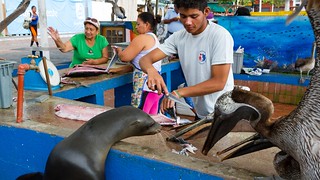
PREV ARTICLE
NEXT ARTICLE
FULL ISSUE
PREV FULL ISSUE
WITHOUT MONEY, GALAPAGOS RESIDENTS BARTERFor years now we've been inching closer and closer to a world where coins and paper money no longer exist in daily commerce, as money goes electronic. But what would happen if money itself goes away? Well, the world might start to look like it did before the concept of money was invented. Here's what happened during the pandemic in the Galápagos Islands, an isolated chain off Ecuador - yes, the same remote place Charles Darwin visited in 1834 and began forming his theory of evolution. I only came across this March 20, 2021 Outside essay this week. Here's an excerpt - see the complete article online. -Editor As traffic and then goods started to slow from the continent, Galápageños turned to each other and a simpler way of life to take care of themselves.
Cash wasn't abandoned entirely—even during the strictest lockdown measures from March to June, locals had to use it to pay for fuel for fishing boats that brought in catch on behalf of the community (there was no shortage of fuel, due to an excess created from the lack of ship, taxi, and tour bus usage), among other transactions. Upon returning, the day's bounty was announced over megaphones, and fish that would ordinarily be exported to Miami at great expense was taken door to door and simply given away, with the understanding that the fisherman and their families would be taken care of with other goods and services in return. As of March 2021, Santa Cruz has seen a slight improvement in tourist numbers, reducing its dependency on bartering. Though many local businesses remain closed, supply lines from the mainland are no longer an issue, and with the arrival of vaccines, hope for more of a revival later this year is growing. The same cannot be said on remote Isabela, where the reliance on trading has continued in lieu of visitor dollars. The internet connection on the island is notoriously unreliable, but there is enough bandwidth to coordinate through a huge and sometimes unruly WhatsApp group of 256 members, the maximum allowed by the app. Valladares explained that this ramshackle marketplace was also being supplemented by hunting feral animals. In the 1800s, buccaneers brought animals like pigs, goats, donkeys, and cattle to the islands, where they quickly broke loose, settled, and started causing havoc for endemic species, trampling on bird nests, eating young tortoises, and spreading seeds of invasive flora. For decades, the progeny of these original invaders have been reduced, though they still inhabit the park and roaming freely on Isabela. At the start of the pandemic, residents revived a form of hunting, heading out of town on horseback and returning with feral cattle or pigs.
... In any case, he expects it will take at least two years for tourism to fully recover here. In the meantime, trading among the islanders will need to continue.
To read the complete article, see:
Wayne Homren, Editor The Numismatic Bibliomania Society is a non-profit organization promoting numismatic literature. See our web site at coinbooks.org. To submit items for publication in The E-Sylum, write to the Editor at this address: whomren@gmail.com To subscribe go to: https://my.binhost.com/lists/listinfo/esylum All Rights Reserved. NBS Home Page Contact the NBS webmaster 
|

